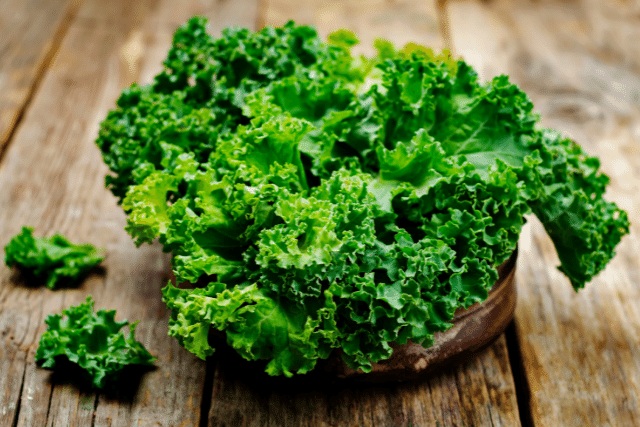Recent Posts
-

- Diabetes-Friendly Nutrition: Smart... 08.12.2024
-

- Nutrition for Chronic... 08.12.2024
-

- Anti-Inflammatory Diet: Food... 08.12.2024
-

- Low-Sodium and Heart-Healthy:... 08.12.2024
-

- Plant-Based Diets for... 08.12.2024
Ten Health Benefits of Organic Kale

If the Durian is the king of fruits, leafy green vegetables also have their kind. And this is Kale. This is one of the most refined and nutrient-dense plant foods. Kale is packed with a wide range of beneficial vitamins, some of which have tremendous therapeutic qualities.
So if you ever visit your local marketplace, don’t forget to add to your grocery list this leafy vegetable. Here are Ten (10) Health Benefits of Organic Kale:
One Of The World's Most Nutrient-Dense Vegetables.
The cabbage family includes the famous vegetable kale. It comes in a plethora of varieties. The leaves might be green or purple, and they can either be smooth or wavy.
A single cup of raw kale includes Vitamin A, K, C, B6, Manganese, Copper, and much more for its nutrients. But how come it is nutrient-dense with all of these vitamins given?
Kale is one of the most nutrient-dense foods on the planet because of its low-calorie level. Adding extra kale to your diet is an excellent method to boost your intake of essential nutrients.
Loaded With Powerful Antioxidants
Antioxidants are abundant in kale, as they are in other leafy greens (substances that help counteract oxidative damage by free radicals in the body), as well as vitamin C, beta-carotene, and a variety of flavonoids and polyphenols.
In addition, a number of antioxidant-related compounds have other roles that are just as significant. Kale contains substantial levels of the flavonoids quercetin and kaempferol. A few of these compounds' beneficial benefits include cardiac protection, blood pressure reduction, anti-inflammatory properties, antiviral properties, antidepressant properties, and anti-cancer properties.
Excellent Source of Vitamin C
In the body's cells, vitamin C acts as a critical water-soluble antioxidant and performs various crucial tasks. For instance, collagen, the most prevalent structural protein in the body, requires the presence of vitamin C.
Compared to most other vegetables, kale has around 4.5 times as much vitamin C as spinach. It is an excellent source of vitamin C and is more concentrated than Orange.
Help Lower Cholesterol
Cholesterol serves a wide variety of purposes inside the human body. For example, bile acids, which aid in fat digestion, are synthesized.
Binding bile acid sequestrants in the digestive tract may prevent them from being reabsorbed (fats), so they are often used in supplementation. Cholesterol is reduced as a result of this.
Bile acid sequestrants found in kale may help decrease cholesterol levels. Over time, this might lower the risk of heart disease.
Drinking kale juice every day for 12 weeks boosted HDL (the "good" cholesterol) by 27% and decreased LDL (the "bad" cholesterol) by 10% while increasing antioxidant status.
Best Sources of Vitamin K
Vitamin K is a vital component of a healthy diet. An essential part of the process is activating specific proteins, which allow them to bind calcium.
You can get almost seven times the recommended daily amount of vitamin K in one raw cup of kale.
Kale contains Anticancer Agents.
Unchecked cell development is a hallmark of cancer, a horrible illness. Kale is packed with chemicals that are thought to have cancer-fighting properties.
One of them is sulforaphane, a chemical that has been found to aid in the molecular battle against cancer. Additionally, it includes indole-3-carbinol, which is thought to assist in the prevention of cancer.
A good source of Beta-Carotene.
According to popular belief, kale is an excellent source of vitamin A; however, this isn't always the case. The antioxidant beta-carotene, which the body may convert to vitamin A, is abundant in this food.
Rich in Minerals That the Average Person Doesn't Get Enough Of
Kale has a plethora of nutrients, many of which are missing in many individuals' diets. Calcium, a mineral critical to bone health, is found in abundance in this product, a rich supply of calcium from a plant source.
In addition, it provides a significant amount of magnesium, an essential element that most people don't get enough of. Magnesium may help prevent type 2 diabetes and heart disease by increasing insulin sensitivity.
Potassium, which is abundant in kale, aids in the maintenance of cellular electrical gradients. Blood pressure and heart disease risk decrease when people consume enough potassium in their diets.
Powerful Anti-Aging Nutrients: Lutein and Zeaxanthin
Eyesight deterioration is one of the most typical side effects of aging. Unfortunately, this may be avoided thanks to many dietary components.
Kale and other vegetables high in carotenoid antioxidants, such as lutein and zeaxanthin, are the best sources.
According to a slew of research, people who consume enough lutein and zeaxanthin have a decreased chance of developing common eye problems.
Lose Weight More Easily
Kale is a weight loss-friendly meal for several reasons. It has a low-calorie count but a large bulk, which should help you feel full.
Kale has a low energy density because of its low calorie and high water content. Weight reduction may be aided by regularly consuming a wide variety of low-energy-density meals.
Small levels of protein and fiber may be found in kale as well. In terms of weight loss, these two nutrients are critical. There is no evidence that kale aids weight reduction, but it makes logical that it may be an excellent addition to a diet for those trying to lose weight.
Source:
https://www.healthline.com/nutrition/10-proven-benefits-of-kale





